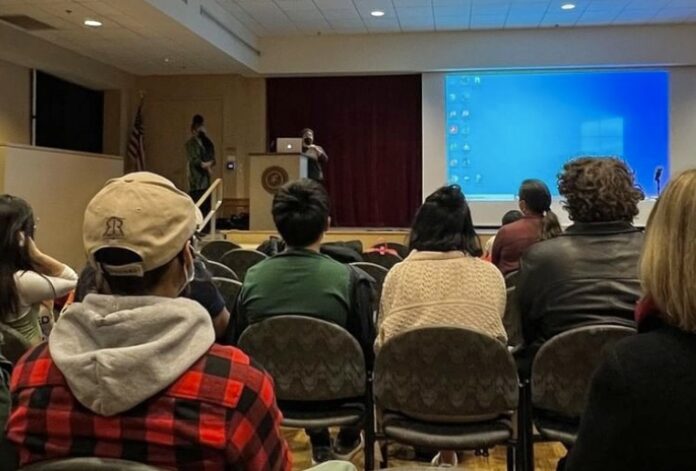This month, the Africana studies program, the Black Students Association and the Office of Multicultural Life, have been sponsoring events in celebration of Black History Month. Last week on Feb. 10, a screening of “Judas and the Black Messiah,” a 2021 film directed by Shaka King and starring Daniel Kaluuya and LaKeith Stanfield was held. Hosted by Professor Roberta Meek, lecturer in media and communication and Africana studies, and Emanuela Kucik, Ph.D, assistant professor of English and Africana studies, the screening was accompanied by an information session prior, which served to educate the audience on the true history of the Black Panthers.
Meek and Kucik discussed everything from the inception of the Panthers, the Ten-Point Program they hoped to achieve, their battle against fascism and more. Afterward, Meek and Kucik allowed for open conversation where anyone could voice their thoughts and opinions on the film and how it relates to our world.
“To see a depiction that is more honest to the real story is crucial to address the racism our history books and classes have taught us.”
– Bridget Parks ‘25
The Black Panther Party has always been a historically misrepresented group, from being shown as the aggressive antithesis to Martin Luther King Jr. in U.S. history textbooks to even being erased from the narrative of the Civil Rights Movement altogether. This supposedly violent and rebellious paramilitary terrorist organization was—in reality—a force for good and change within the world.
“Time and time again, we see how history is controlled by people, specifically white people, who hold enough power to control the narrative. The misconceptions about who the Black Panther party is are seen everywhere in history classes and textbooks. To see a depiction that is more honest to the real story is crucial to address the racism our history books and classes have taught us,” said attendee Bridget Parks ‘25.
The Black Panther Party was originally entitled “The Black Panther Party for Self-Defense.” It was founded in 1966 by Bobby Seale and Huey Newton. The group monitored police activity in the Oakland area through the practice of openly carrying guns to defend their community. For this, they were viewed as violent. The Black Panthers went on to be a bold and powerful symbol not just for Black Power, but for overall unity against oppression and fascism. Eventually, they turned their attention from just monitoring police brutality to actively taking a part in bettering their communities through education and outreach programs.
As the party rose to national prominence, they started to garner the attention of the Federal Bureau of Investigation (FBI), specifically the Counter Intelligence Program (COINTELPRO), a branch tasked with targeting and infiltrating political groups that posed a threat to the U.S. Government. COINTELPRO set its sights on the deputy chairman of the Black Panther Party: Fred Hampton. Hampton began to rise to prominence as a unifying force not only in regards to Black communities, but also oppressed groups as a whole, uniting them against the capitalism and fascism orchestrated by the U.S. government.
“It was a very welcoming space, with Hispanic, white, Black [and] Asian representation there, people just trying to learn more about the Black Panthers…”
– Andre Rojas ‘25
This operation is documented in the film, “Judas and the Black Messiah.” Based on true events, the film depicts Bill O’Neal (Stanfield) who is blackmailed into becoming a spy for COINTELPRO as he grows closer to Hampton (Kaluuya), eventually aiding in his assassination. The film is a harrowing and nerve-racking retelling of this story, garnering mass critical acclaim and earning a nomination for Best Picture at the Academy Awards, with Kaluuya winning Best Supporting Actor for his outstanding performance as Hampton.
Andre Rojas ‘25, another attendee of the event, commented that “‘Judas and the Black Messiah’ is one of the best movies that shows the Black Panther Party and Fred Hampton in the light of the truth, and not the radicalized version that schools have fed us for years… It was a very welcoming space, with Hispanic, white, Black [and] Asian representation there, people just trying to learn more about the Black Panthers, whether they have some knowledge or no knowledge about it.”
Parks commented on the importance of event attendance, “As a white person, it is our job at the bare minimum, to listen to these stories and the impact it has on students here. This includes sitting down and watching the film, but also staying for the conversation students had.”
This event showed the lasting power of Hampton’s legacy, that after viewing this story of adversity and defeat, hope is still an option. Hampton stood above all else for unity and strength against oppression and it is clear that even in death, Hampton’s story is able to inspire that same urge for unification and the power of the people.























[…] Originally published at The Muhlenberg Weekly –https://muhlenbergweekly.com/arts-culture/utilizing-the-silver-screen-for-black-history-month-celebr… […]